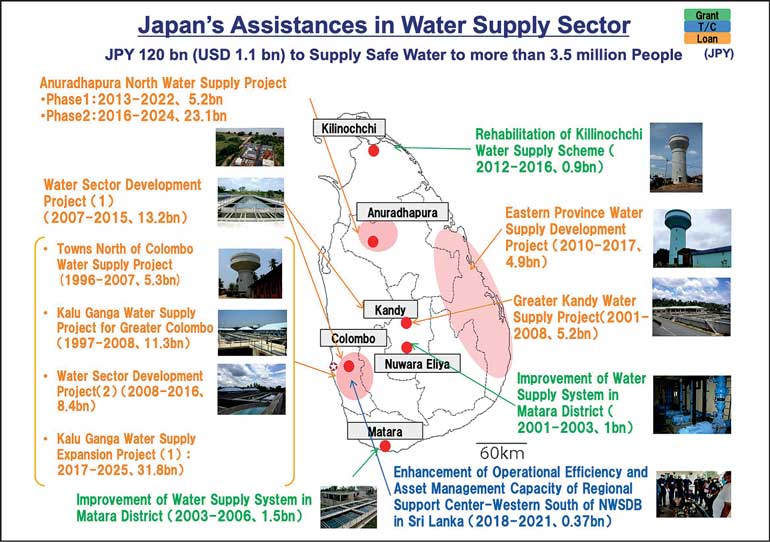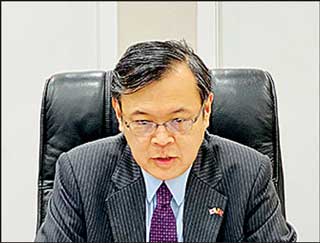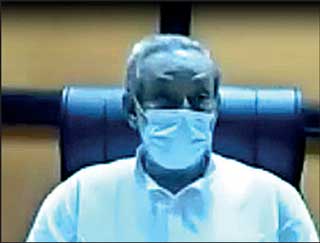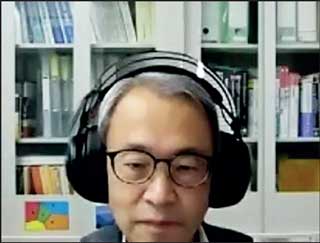Tuesday Feb 17, 2026
Tuesday Feb 17, 2026
Wednesday, 1 December 2021 00:00 - - {{hitsCtrl.values.hits}}

Project map
The Embassy of Japan recently hosted an online seminar entitled ‘Japan’s Experiences on Water Supply
 |
| Former Japanese Ambassador Sugiyama Akira |
 |
| Water Supply Minister Vasudeva Nanayakkara |
 |
| Prof. Takizawa Satoshi, University of Tokyo |
Development’ with the participation of the Ministry of Water Supply and Ministry of Irrigation by inviting Prof. Takizawa Satoshi of the University of Tokyo, a leading expert in the field of water supply in Japan, as a lecturer.
The then Ambassador of Japan to Sri Lanka Sugiyama Akira and Minister of Water Supply Vasudeva Nanayakkara attended the seminar, along with more than 250 officials across the country.
Historically, in Sri Lanka, national authorities have attached central importance to water-related projects since time immemorial, and Sri Lanka is proud of its distinguished history of world-famous hydrological technology, as evidenced by the renowned Sigiriya rock and by the presence of numerous reservoirs or tanks in various parts of the island.
On the basis of such great tradition, which has nourished the fertile land of this beautiful country, Japan has been extending assistance to Sri Lanka in providing safe drinking water for all the people in Sri Lanka with Japan’s accumulated knowledge and experience.
Prof. Takizawa is a Chairman of New Vision for Japanese Water Supply and served as a member of the Supervisory Committee of Japan’s Experiences on Water Supply Development in 2017. He has an extensive experience in working for the Japanese ODA projects, and has been supervising a Sri Lankan official of National Water Supply and Drainage Board, who has been studying in Japan since 2020.
In his lecture, Prof. Takizawa shared his knowledge and experience of Japan’s water supply development while referring to the common challenges facing developing countries, as well as to the problems particular to Sri Lanka. Prof. Takizawa also explained the way to tackle these challenges based on the experiences in Japan and other countries.
In the welcoming remarks, Ambassador Sugiyama said, “Water supply development is one of the priority areas in the Government of Japan’s development assistance to Sri Lanka. Over the past 30 years, Japan has contributed over JPY 120 billion ($ 1.1 billion) with more than 30 projects to meet the genuine needs of Sri Lanka in the areas of water supply, sanitation and hygiene throughout the country. Japan has assisted in supplying safe drinking water to more than 3.5 million people, about 15% of the population in Sri Lanka. I believe that the Japan’s technology and experience, which will be shared by Professor Takizawa today, will contribute to the Government of Sri Lanka’s efforts in further accelerating the proclaimed ‘Water for All’ initiative, which aims to provide safe drinking water to all the citizens by 2025. I hope this seminar will help our two countries further promote bilateral cooperation in water supply development.”
Nanayakkara expressed his profound gratitude, stating: “Currently, the water supply coverage in Sri Lanka is 54% of the population, but we aim to provide clean and safe drinking water to all the citizens by 2025 under the ‘Vistas of Prosperity and Splendour’. In this regard, we highly appreciate this great occasion to learn and utilise from Japan’s advanced knowledge and experience shared by Prof. Takizawa today. Japan is the largest bilateral donor in the water supply development sector in Sri Lanka and we deeply appreciate Japan’s continued commitment in the field of water supply development.”
Prof. Takizawa said: “Japan’s water supply coverage is almost 100%, and Japan has excellent technology and experience among developed countries in terms of water quality and low leakage rate. ‘Water’ is most fundamental social infrastructure that forms the basis of all activities, including people’s lives, livelihoods, and economic development. I believe Japan’s experience and knowledge of water supply development, which achieved rapid expansion and led to provide the world’s most advanced water supply services, will be utilised in the development of water supply in Sri Lanka.”
As a longstanding friend of Sri Lanka, the Government of Japan will remain in solidarity to assist the efforts of the Government of Sri Lanka in providing safe water to people all over the country.
Japan’s water development programs in Sri Lanka
Surrounded by the sea, Japan is under unfavourable conditions for the development and use of water resources, given the weather conditions with precipitation concentrated during the rainy season, typhoons and snowfall as well as the geographical conditions with forests covering about 70% of the country’s land area and many steep and short rivers.
Despite such harsh circumstances, Japan has achieved a rapid expansion of water supply system. Utilising the world’s most advanced knowledge and technology, Japan has a long history of assistance in the field of water development to Sri Lanka, an equally beautiful island nation, for over 30 years, with a total amount of about 120 billion yen ($ 1.1 billion) and more than 30 projects in grant, loan, and technical cooperation, mostly through Japan International Cooperation Agency (JICA).
Japan has contributed to supplying safe drinking water for more than 3.5 million people, about 15% of the population in this nation.
Expansion of water supply in both urban and rural areas
Leveraging its rich experience, Japan has contributed to expanding water supply to metropolitan areas such as Greater Colombo and Greater Kandy, where the demand for water is increasing due to rapid urbanisation, as well as to rural areas across the country through the spread of piped water supply.
Through these projects to provide clean and safe water, which is essential to any economic activities, Japan has contributed to quality and inclusive economic growth in Sri Lanka by promoting urbanisation and industrialisation as well as by mitigating regional disparities in economic development.
Improvement of public health, gender, and human development
Along with the expansion of the water supply population, the conversion from groundwater use to safe drinking piped water has been also promoted. As a result, health hazards such as dental fluorosis and chronic kidney disease, which are assumed to be caused by contaminated groundwater with pesticides and high concentrations of fluoride, will be alleviated with improved public health and living environment.
Especially in rural areas, women and children who were engaged in bringing water from wells have been freed from hard labour. Consequently, this has ensured access to better work and education with improved standard of living for women and children, resulting in a positive contribution to gender and human development.
Assistance in rural areas and conflict-affected areas
In order to meet the tightening demand for drinking water, Japan has provided grant assistance for the development of new water resources in Matara Province, where water supply was severely cut off due to the drought in 2001, and in Nuwara Eliya, where dependence on unhygienic alternative water sources was unavoidable due to insufficient water during the dry season.
Further grant assistance was also extended to supply clean water to more than 10,000 people in Kilinochchi, which was the main battlefield of a 30-year civil war and relied on water trucks as the only water supply facility was damaged during the conflict.
In the Northern and Eastern Provinces, where water facilities and living infrastructure were devastated by the civil war and the tsunami, Japan has been supporting the development of water and other basic infrastructure directly related to the livelihoods and business activities of the residents, including local roads, small- and medium-scale irrigation, and small-scale water supply.
Ongoing projects – Anuradhapura, Colombo, and Kalutara
Ongoing projects include the development of water supply facilities in Anuradhapura, Colombo and Kalutara, as well as a training program on water supply management for the NWSDB. Through the Anuradhapura North Water Supply Project, the water supply population in the covered areas of Anuradhapura is expected to increase by 130,000 (+448%), the water supply coverage to improve from 0% to 55% and 70% respectively, and the fluoride concentration in drinking water to be reduced by about 50% to 70%.
Under the Kalu Ganga Water Supply Expansion Project, the number of additional individual connections in Colombo and Kalutara districts is projected to increase by about 97,000 units (+67%) and the daily water supply will increase more than double. In the technical cooperation for the NWSDB, JICA assisted the NWSDB improve non-revenue water management and pipeline management by constructing a training yard.
Other assistance (PPPs, training programs in Japan)
Another example of Japan’s support is the Public-Private Partnership projects that utilise the technology and know-how of Japanese local governments (waterworks bureaus) and small and medium-sized enterprises. Such PPP projects aim to improve the efficiency of water services of NWSDB by transferring technology of leak detection and monitoring, efficient fee collection systems, and ozone treatment technology for industrial wastewater.
Further, Japan has implemented technical training programmes for a wide range of national and local government officials of Sri Lanka in the water sector since the mid-1950s to help develop human resources with the problem-solving skills.
Japan’s solidarity and commitment in water development
As a long-standing friend of Sri Lanka, Japan has been playing an important role in the water development sector in Sri Lanka through both public and private sectors. Water development is one of the highest priorities for the Government of Japan’s assistance toward Sri Lanka.
Japan will remain committed to assisting the supply of safe water and the improvement of the sanitation environment through providing high-quality infrastructure and sharing advanced water management technology and expertise to realise the ‘Water for All’ initiative of the Government of Sri Lanka.